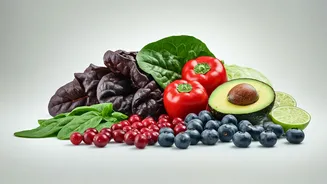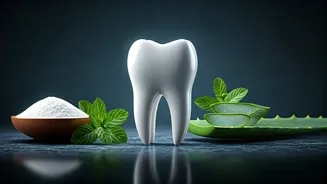Introduction: Kidney Health
Kidneys are indispensable organs that filter waste and excess fluids from your blood. They perform vital functions like maintaining blood pressure, producing
hormones, and regulating electrolyte balance. Dietary choices greatly influence kidney health. Poor dietary habits can strain the kidneys, potentially leading to damage over time. Conversely, a diet rich in kidney-friendly foods can help support optimal function. Recognizing the crucial role diet plays in kidney health helps one proactively make informed choices to safeguard this essential organ. Focusing on specific foods known for their benefits can make a real difference in promoting kidney health and preventing complications. This includes carefully choosing what to eat and drink. By integrating these foods into your diet, you can start proactively protecting your kidneys for the long term and support your overall well-being.
1. Apples: Delicious Protection
Apples are a rich source of fiber and antioxidants, which are beneficial for kidney health. The fiber content in apples helps to regulate blood sugar levels, a critical factor in preventing kidney damage. High blood sugar can stress the kidneys, making them work harder and potentially leading to damage. The antioxidants in apples combat free radicals, protecting the kidneys from oxidative stress. Oxidative stress is caused by unstable molecules that can damage cells and tissues. Regular consumption of apples helps in reducing inflammation, which is vital as chronic inflammation can contribute to kidney disease. Whether eaten whole, sliced, or as part of a smoothie, apples provide a delicious and healthy way to support kidney health. Apples can be a convenient addition to meals and snacks, offering a burst of flavor and nutritional benefits to protect your kidneys and promote overall well-being. For maximum benefits, choose fresh apples over processed apple products, which may contain added sugars and preservatives that can be detrimental to kidney health.
2. Berries: Antioxidant Powerhouse
Berries such as blueberries, strawberries, and raspberries are loaded with antioxidants that protect the kidneys from damage. These antioxidants help neutralize free radicals, which are unstable molecules that can harm kidney cells. Berries are low in sodium, phosphorus, and potassium, making them ideal for individuals with kidney issues. High levels of these minerals can put a strain on the kidneys. Berries are naturally sweet and can satisfy cravings without adding excess sugar, which is important for people with diabetes, a leading cause of kidney disease. Adding berries to your diet provides a tasty and nutritious boost. They can be enjoyed as a snack, added to breakfast cereals, or incorporated into smoothies. Berries are easy to include in any diet and supply vital nutrients that are kidney-friendly and delicious. Including berries offers a flavorful and effective way to promote kidney health, ensuring the kidneys receive the support they need to function optimally.
3. Cauliflower: Versatile Vegetable
Cauliflower is a versatile vegetable that is excellent for kidney health, as it is low in potassium, phosphorus, and sodium, making it gentle on the kidneys. It's also rich in vitamin C, vitamin K, and folate, which support overall health without overworking the kidneys. Cauliflower contains compounds like indoles, which may help to detoxify the body and protect against kidney damage. It is a fantastic source of fiber, which aids in digestion and helps regulate blood sugar levels, reducing the risk of kidney complications. Cauliflower's mild flavor and adaptable nature make it perfect for various dishes. It can be consumed raw in salads, steamed as a side dish, or mashed as a substitute for potatoes. It's a healthy, simple way to add beneficial nutrients to your diet, supporting your kidney health and overall well-being. By integrating cauliflower into your meals, you can enjoy a nutritious, kidney-friendly option that is both delicious and effective in supporting kidney function.
4. Red Bell Peppers: Vitamin C Source
Red bell peppers are rich in antioxidants and vitamins, which is particularly beneficial for kidney health. They are an excellent source of vitamin C, which is a potent antioxidant that supports immune function and protects kidney cells from damage. Red bell peppers are low in potassium, making them a safe choice for people with kidney problems who need to limit their potassium intake. They also contain vitamins A, B6, and folic acid, supporting general health and reducing the likelihood of complications. Red bell peppers also offer a great amount of fiber, which helps keep blood sugar levels in check. They can be eaten raw in salads, roasted, or added to various dishes. They offer a burst of flavor and a boost of nutrients that promote overall health. Incorporating red bell peppers into your diet can be a delicious way to support kidney health. Their low potassium content and high vitamin content make them a smart choice, supporting the kidneys in their vital functions and helping maintain overall health.
5. Garlic: Flavorful Protector
Garlic not only adds flavor but also supports kidney health through its antioxidant and anti-inflammatory properties. Garlic helps reduce inflammation, which can protect the kidneys from damage. Garlic is also known for its ability to lower blood pressure, as hypertension is a major risk factor for chronic kidney disease. This helps to protect the kidneys from damage. Garlic's natural compounds can help to detoxify the body and protect against damage from free radicals. Incorporating garlic into your diet is simple and flavorful. It can be added to virtually any savory dish, from stir-fries to soups and stews. Garlic provides a flavorful boost to meals while also providing numerous health benefits. By adding garlic to your diet, you support your kidney health and enhance your overall well-being. Use garlic regularly in your cooking to naturally support your kidneys and protect them from potential harm.













